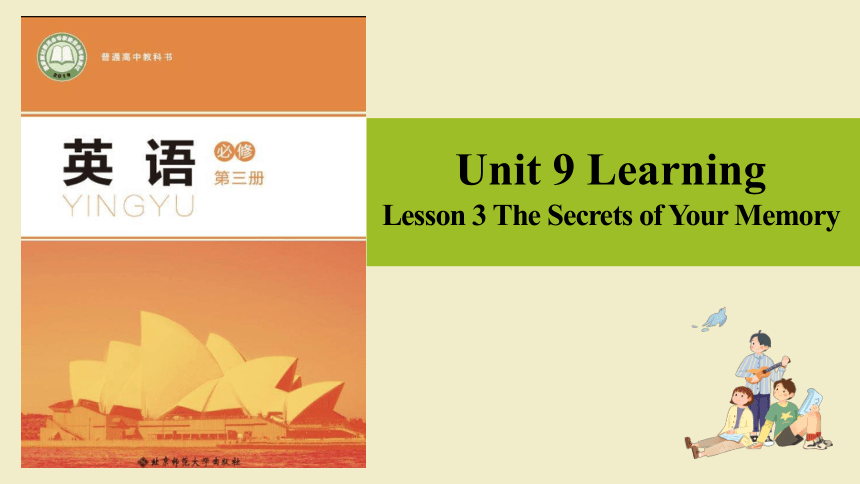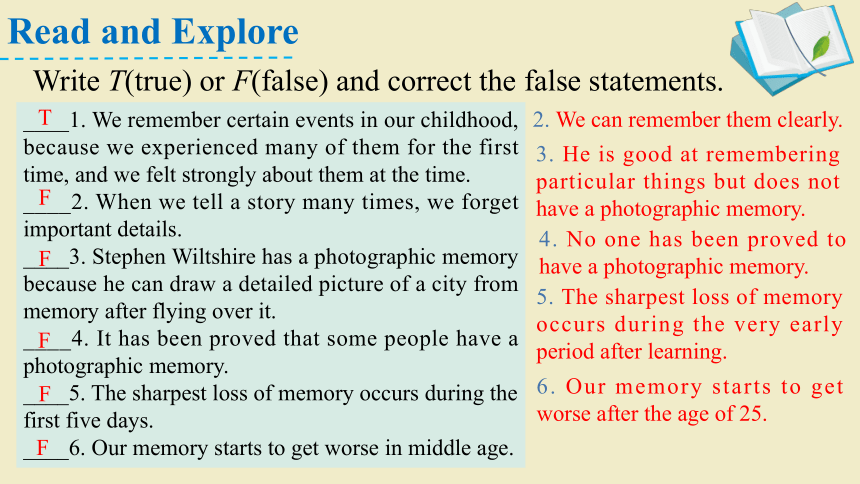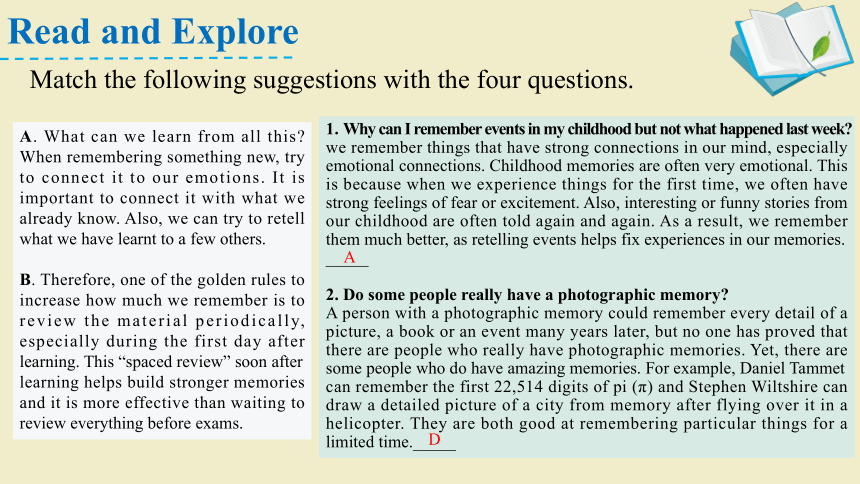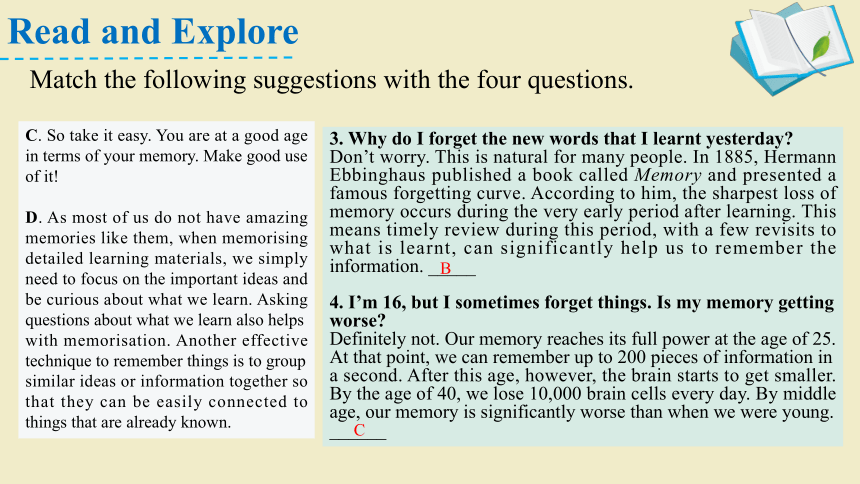2020-2021学年高一英语北师大版(2019)必修三 Unit 9 Lesson 3 The Secrets of Your Memory 课件(共13张PPT)
文档属性
| 名称 | 2020-2021学年高一英语北师大版(2019)必修三 Unit 9 Lesson 3 The Secrets of Your Memory 课件(共13张PPT) |

|
|
| 格式 | zip | ||
| 文件大小 | 2.6MB | ||
| 资源类型 | 教案 | ||
| 版本资源 | 北师大版(2019) | ||
| 科目 | 英语 | ||
| 更新时间 | 2021-08-11 16:49:48 | ||
图片预览






文档简介
(共13张PPT)
Unit
9
Learning
Lesson
3
The
Secrets
of
Your
Memory
Activate
and
Share
emotional:
relating
to
feelings
retell:
to
tell
a
story
again
in
different
words
photographic
memory:
a
person
who
has
photographic
memory
can
remember
exactly
every
detail
of
sth
they
have
seen
timely:
done
at
exactly
the
right
time
revisit:
to
talk
about
or
think
of
sth
again
in
order
to
improve
it
periodically:
happening
at
regular
times
Words
and
phrases
Read
and
Explore
Read
the
text
quickly.
____1.
We
remember
certain
events
in
our
childhood,
because
we
experienced
many
of
them
for
the
first
time,
and
we
felt
strongly
about
them
at
the
time.
____2.
When
we
tell
a
story
many
times,
we
forget
important
details.
____3.
Stephen
Wiltshire
has
a
photographic
memory
because
he
can
draw
a
detailed
picture
of
a
city
from
memory
after
flying
over
it.
____4.
It
has
been
proved
that
some
people
have
a
photographic
memory.
____5.
The
sharpest
loss
of
memory
occurs
during
the
first
five
days.
____6.
Our
memory
starts
to
get
worse
in
middle
age.
T
F
F
F
F
F
2.
We
can
remember
them
clearly.
3.
He
is
good
at
remembering
particular
things
but
does
not
have
a
photographic
memory.
4.
No
one
has
been
proved
to
have
a
photographic
memory.
5.
The
sharpest
loss
of
memory
occurs
during
the
very
early
period
after
learning.
6.
Our
memory
starts
to
get
worse
after
the
age
of
25.
Write
T(true)
or
F(false)
and
correct
the
false
statements.
Read
and
Explore
Match
the
following
suggestions
with
the
four
questions.
A.
What
can
we
learn
from
all
this?
When
remembering
something
new,
try
to
connect
it
to
our
emotions.
It
is
important
to
connect
it
with
what
we
already
know.
Also,
we
can
try
to
retell
what
we
have
learnt
to
a
few
others.
B.
Therefore,
one
of
the
golden
rules
to
increase
how
much
we
remember
is
to
review
the
material
periodically,
especially
during
the
first
day
after
learning.
This
“spaced
review”
soon
after
learning
helps
build
stronger
memories
and
it
is
more
effective
than
waiting
to
review
everything
before
exams.
1.
Why
can
I
remember
events
in
my
childhood
but
not
what
happened
last
week?
we
remember
things
that
have
strong
connections
in
our
mind,
especially
emotional
connections.
Childhood
memories
are
often
very
emotional.
This
is
because
when
we
experience
things
for
the
first
time,
we
often
have
strong
feelings
of
fear
or
excitement.
Also,
interesting
or
funny
stories
from
our
childhood
are
often
told
again
and
again.
As
a
result,
we
remember
them
much
better,
as
retelling
events
helps
fix
experiences
in
our
memories.
_____
2.
Do
some
people
really
have
a
photographic
memory?
A
person
with
a
photographic
memory
could
remember
every
detail
of
a
picture,
a
book
or
an
event
many
years
later,
but
no
one
has
proved
that
there
are
people
who
really
have
photographic
memories.
Yet,
there
are
some
people
who
do
have
amazing
memories.
For
example,
Daniel
Tammet
can
remember
the
first
22,514
digits
of
pi
(π)
and
Stephen
Wiltshire
can
draw
a
detailed
picture
of
a
city
from
memory
after
flying
over
it
in
a
helicopter.
They
are
both
good
at
remembering
particular
things
for
a
limited
time._____
A
D
Read
and
Explore
C.
So
take
it
easy.
You
are
at
a
good
age
in
terms
of
your
memory.
Make
good
use
of
it!
D.
As
most
of
us
do
not
have
amazing
memories
like
them,
when
memorising
detailed
learning
materials,
we
simply
need
to
focus
on
the
important
ideas
and
be
curious
about
what
we
learn.
Asking
questions
about
what
we
learn
also
helps
with
memorisation.
Another
effective
technique
to
remember
things
is
to
group
similar
ideas
or
information
together
so
that
they
can
be
easily
connected
to
things
that
are
already
known.
3.
Why
do
I
forget
the
new
words
that
I
learnt
yesterday?
Don’t
worry.
This
is
natural
for
many
people.
In
1885,
Hermann
Ebbinghaus
published
a
book
called
Memory
and
presented
a
famous
forgetting
curve.
According
to
him,
the
sharpest
loss
of
memory
occurs
during
the
very
early
period
after
learning.
This
means
timely
review
during
this
period,
with
a
few
revisits
to
what
is
learnt,
can
significantly
help
us
to
remember
the
information.
_____
4.
I’m
16,
but
I
sometimes
forget
things.
Is
my
memory
getting
worse?
Definitely
not.
Our
memory
reaches
its
full
power
at
the
age
of
25.
At
that
point,
we
can
remember
up
to
200
pieces
of
information
in
a
second.
After
this
age,
however,
the
brain
starts
to
get
smaller.
By
the
age
of
40,
we
lose
10,000
brain
cells
every
day.
By
middle
age,
our
memory
is
significantly
worse
than
when
we
were
young.
______
B
C
Match
the
following
suggestions
with
the
four
questions.
Read
and
Explore
Write
out
the
truths
and
advice
Jemima
Gryaznov
discusses
in
the
text.
Truth
1:
Advice
1:
Truth
2:
Advice
2:
We
remember
things
that
have
strong
connections
in
our
mind,
especially
emotional
connections.
We
need
to
make
strong
connections
with
things
we
want
to
remember
in
our
mind,
especially
emotional
connections.
Nobody
has
a
photographic
memory.
We
need
to
focus
on
the
important
ideas
and
be
curious
about
what
we
learn
when
memorising
complex
learning
materials.
Read
and
Explore
The
sharpest
loss
of
memory
occurs
during
the
very
early
period
after
learning.
We
need
to
review
the
information
at
regular
intervals,
especially
in
the
first
day
after
learning
it.
Our
memory
reaches
its
full
power
at
the
age
of
25.
We
need
to
train
our
memory
to
remember
more
when
we’re
older.
Read
and
Explore
Write
out
the
truths
and
advice
Jemima
Gryaznov
discusses
in
the
text.
Truth
3:
Advice
3:
Truth
4:
Advice
4:
Discuss
the
following
question
with
your
partner.
examples:
For
example
...
figures:
a
famous
forgetting
curve
quote:
According
to
...
numbers:
25,
200,
40
To
make
her
statements
convincing
the
expert
used:
Read
and
Explore
How
has
the
expert
tried
to
make
her
statements
to
each
question
convincing?
What
signal
words
can
you
find?
Replace
the
underlined
words
or
phrase
with
the
words
from
the
text.
1.
Jemima
Gryaznov
thinks
people
remember
things
that
have
strong
sentimental
attachment.
1._________
2.
When
we
do
things
with
enthusiasm,
we
tend
to
remember
them
well.
2.__________
3.
When
we
try
to
remember
detailed
materials,
we
should
focus
on
the
important
ideas.
3.
_________
4.
Jemima
Gryaznov
suggested
another
effective
method
to
remember
things:
grouping
similar
ideas
or
information
together.
4.
________
5.
A
good
strategy
to
increase
memory
is
to
review
the
material
you
are
trying
to
remember
often.
5.
__________
emotional
excitement
memorise
technique
periodically
Read
and
Explore
Subject-Verb
Agreement
Circle
the
subject
and
fill
in
the
blanks.
Retelling
events
_______
(help)
fix
experiences
in
our
memories.
There
______
(be)
some
people
who
do
have
amazing
memories.
They
_______
(be)
both
good
at
remembering
particular
things
for
a
limited
time.
One
of
the
golden
rules
to
increase
how
much
we
remember
____(be)
to
review
the
material
periodically.
Sentence
Builder
helps
are
are
is
Circle
the
correct
answer.
1.
If
anybody
has
/
have
any
tips
for
memorising
information,
I
would
like
to
hear
them.
2.
Many
experts
says
/
say
that
you
should
review
information
periodically
after
you
learn
it.
3.
Each
of
the
students
is
/
are
trying
one
of
these
memorising
techniques
this
week.
4.
Both
of
my
English
teachers
tells
/tell
me
to
ask
questions
to
identify
the
most
important
information
I
need
to
remember.
5.
Writing
information
down
clearly
makes
/
make
it
easier
for
you
to
review
it
later.
Subject-Verb
Agreement
Thank
you
!
Unit
9
Learning
Lesson
3
The
Secrets
of
Your
Memory
Activate
and
Share
emotional:
relating
to
feelings
retell:
to
tell
a
story
again
in
different
words
photographic
memory:
a
person
who
has
photographic
memory
can
remember
exactly
every
detail
of
sth
they
have
seen
timely:
done
at
exactly
the
right
time
revisit:
to
talk
about
or
think
of
sth
again
in
order
to
improve
it
periodically:
happening
at
regular
times
Words
and
phrases
Read
and
Explore
Read
the
text
quickly.
____1.
We
remember
certain
events
in
our
childhood,
because
we
experienced
many
of
them
for
the
first
time,
and
we
felt
strongly
about
them
at
the
time.
____2.
When
we
tell
a
story
many
times,
we
forget
important
details.
____3.
Stephen
Wiltshire
has
a
photographic
memory
because
he
can
draw
a
detailed
picture
of
a
city
from
memory
after
flying
over
it.
____4.
It
has
been
proved
that
some
people
have
a
photographic
memory.
____5.
The
sharpest
loss
of
memory
occurs
during
the
first
five
days.
____6.
Our
memory
starts
to
get
worse
in
middle
age.
T
F
F
F
F
F
2.
We
can
remember
them
clearly.
3.
He
is
good
at
remembering
particular
things
but
does
not
have
a
photographic
memory.
4.
No
one
has
been
proved
to
have
a
photographic
memory.
5.
The
sharpest
loss
of
memory
occurs
during
the
very
early
period
after
learning.
6.
Our
memory
starts
to
get
worse
after
the
age
of
25.
Write
T(true)
or
F(false)
and
correct
the
false
statements.
Read
and
Explore
Match
the
following
suggestions
with
the
four
questions.
A.
What
can
we
learn
from
all
this?
When
remembering
something
new,
try
to
connect
it
to
our
emotions.
It
is
important
to
connect
it
with
what
we
already
know.
Also,
we
can
try
to
retell
what
we
have
learnt
to
a
few
others.
B.
Therefore,
one
of
the
golden
rules
to
increase
how
much
we
remember
is
to
review
the
material
periodically,
especially
during
the
first
day
after
learning.
This
“spaced
review”
soon
after
learning
helps
build
stronger
memories
and
it
is
more
effective
than
waiting
to
review
everything
before
exams.
1.
Why
can
I
remember
events
in
my
childhood
but
not
what
happened
last
week?
we
remember
things
that
have
strong
connections
in
our
mind,
especially
emotional
connections.
Childhood
memories
are
often
very
emotional.
This
is
because
when
we
experience
things
for
the
first
time,
we
often
have
strong
feelings
of
fear
or
excitement.
Also,
interesting
or
funny
stories
from
our
childhood
are
often
told
again
and
again.
As
a
result,
we
remember
them
much
better,
as
retelling
events
helps
fix
experiences
in
our
memories.
_____
2.
Do
some
people
really
have
a
photographic
memory?
A
person
with
a
photographic
memory
could
remember
every
detail
of
a
picture,
a
book
or
an
event
many
years
later,
but
no
one
has
proved
that
there
are
people
who
really
have
photographic
memories.
Yet,
there
are
some
people
who
do
have
amazing
memories.
For
example,
Daniel
Tammet
can
remember
the
first
22,514
digits
of
pi
(π)
and
Stephen
Wiltshire
can
draw
a
detailed
picture
of
a
city
from
memory
after
flying
over
it
in
a
helicopter.
They
are
both
good
at
remembering
particular
things
for
a
limited
time._____
A
D
Read
and
Explore
C.
So
take
it
easy.
You
are
at
a
good
age
in
terms
of
your
memory.
Make
good
use
of
it!
D.
As
most
of
us
do
not
have
amazing
memories
like
them,
when
memorising
detailed
learning
materials,
we
simply
need
to
focus
on
the
important
ideas
and
be
curious
about
what
we
learn.
Asking
questions
about
what
we
learn
also
helps
with
memorisation.
Another
effective
technique
to
remember
things
is
to
group
similar
ideas
or
information
together
so
that
they
can
be
easily
connected
to
things
that
are
already
known.
3.
Why
do
I
forget
the
new
words
that
I
learnt
yesterday?
Don’t
worry.
This
is
natural
for
many
people.
In
1885,
Hermann
Ebbinghaus
published
a
book
called
Memory
and
presented
a
famous
forgetting
curve.
According
to
him,
the
sharpest
loss
of
memory
occurs
during
the
very
early
period
after
learning.
This
means
timely
review
during
this
period,
with
a
few
revisits
to
what
is
learnt,
can
significantly
help
us
to
remember
the
information.
_____
4.
I’m
16,
but
I
sometimes
forget
things.
Is
my
memory
getting
worse?
Definitely
not.
Our
memory
reaches
its
full
power
at
the
age
of
25.
At
that
point,
we
can
remember
up
to
200
pieces
of
information
in
a
second.
After
this
age,
however,
the
brain
starts
to
get
smaller.
By
the
age
of
40,
we
lose
10,000
brain
cells
every
day.
By
middle
age,
our
memory
is
significantly
worse
than
when
we
were
young.
______
B
C
Match
the
following
suggestions
with
the
four
questions.
Read
and
Explore
Write
out
the
truths
and
advice
Jemima
Gryaznov
discusses
in
the
text.
Truth
1:
Advice
1:
Truth
2:
Advice
2:
We
remember
things
that
have
strong
connections
in
our
mind,
especially
emotional
connections.
We
need
to
make
strong
connections
with
things
we
want
to
remember
in
our
mind,
especially
emotional
connections.
Nobody
has
a
photographic
memory.
We
need
to
focus
on
the
important
ideas
and
be
curious
about
what
we
learn
when
memorising
complex
learning
materials.
Read
and
Explore
The
sharpest
loss
of
memory
occurs
during
the
very
early
period
after
learning.
We
need
to
review
the
information
at
regular
intervals,
especially
in
the
first
day
after
learning
it.
Our
memory
reaches
its
full
power
at
the
age
of
25.
We
need
to
train
our
memory
to
remember
more
when
we’re
older.
Read
and
Explore
Write
out
the
truths
and
advice
Jemima
Gryaznov
discusses
in
the
text.
Truth
3:
Advice
3:
Truth
4:
Advice
4:
Discuss
the
following
question
with
your
partner.
examples:
For
example
...
figures:
a
famous
forgetting
curve
quote:
According
to
...
numbers:
25,
200,
40
To
make
her
statements
convincing
the
expert
used:
Read
and
Explore
How
has
the
expert
tried
to
make
her
statements
to
each
question
convincing?
What
signal
words
can
you
find?
Replace
the
underlined
words
or
phrase
with
the
words
from
the
text.
1.
Jemima
Gryaznov
thinks
people
remember
things
that
have
strong
sentimental
attachment.
1._________
2.
When
we
do
things
with
enthusiasm,
we
tend
to
remember
them
well.
2.__________
3.
When
we
try
to
remember
detailed
materials,
we
should
focus
on
the
important
ideas.
3.
_________
4.
Jemima
Gryaznov
suggested
another
effective
method
to
remember
things:
grouping
similar
ideas
or
information
together.
4.
________
5.
A
good
strategy
to
increase
memory
is
to
review
the
material
you
are
trying
to
remember
often.
5.
__________
emotional
excitement
memorise
technique
periodically
Read
and
Explore
Subject-Verb
Agreement
Circle
the
subject
and
fill
in
the
blanks.
Retelling
events
_______
(help)
fix
experiences
in
our
memories.
There
______
(be)
some
people
who
do
have
amazing
memories.
They
_______
(be)
both
good
at
remembering
particular
things
for
a
limited
time.
One
of
the
golden
rules
to
increase
how
much
we
remember
____(be)
to
review
the
material
periodically.
Sentence
Builder
helps
are
are
is
Circle
the
correct
answer.
1.
If
anybody
has
/
have
any
tips
for
memorising
information,
I
would
like
to
hear
them.
2.
Many
experts
says
/
say
that
you
should
review
information
periodically
after
you
learn
it.
3.
Each
of
the
students
is
/
are
trying
one
of
these
memorising
techniques
this
week.
4.
Both
of
my
English
teachers
tells
/tell
me
to
ask
questions
to
identify
the
most
important
information
I
need
to
remember.
5.
Writing
information
down
clearly
makes
/
make
it
easier
for
you
to
review
it
later.
Subject-Verb
Agreement
Thank
you
!
同课章节目录
- Unit 7 Art
- Lesson 1 Masterpieces
- Lesson 2 Beijing Opera
- Lesson 3 A Musical Genius
- Unit 8 Green living
- Lesson 1 Roots and Shoots
- Lesson 2 Greening the Desert
- Lesson 3 "White Bikes" on the Road
- Unit 9 Learning
- Lesson 1 Active Learning
- Lesson 2 Language Learning Tips
- Lesson 3 The Secrets of Your Memory
